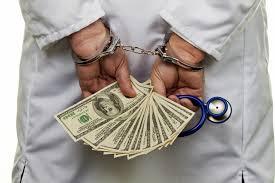Kickbacks in Healthcare: Definition & Examples

Kickbacks in Healthcare: Definition & Examples
The healthcare industry is meant to be driven by patient well-being, medical ethics, and professional responsibility. However, not all practices within the industry align with these principles. One such unethical and illegal practice is kickbacks in healthcare — a form of fraud that can have serious consequences for both providers and patients.
Understanding what kickbacks are, how they operate, and their legal implications is crucial for healthcare professionals, compliance officers, and patients alike. In this article, we’ll break down the definition, common examples, and laws related to kickbacks, while also explaining how to identify and prevent them.
What Are Kickbacks in Healthcare?
In simple terms, a kickback occurs when someone offers, pays, solicits, or receives something of value in exchange for patient referrals or other healthcare business. It’s essentially a “you scratch my back, I’ll scratch yours” arrangement — except it’s illegal when it influences medical decisions.
For example, a physician might refer patients to a specific diagnostic center in exchange for a commission. While it may sound like just a “business deal,” in healthcare, such arrangements can compromise patient care, inflate costs, and violate federal laws like the Anti-Kickback Statute (AKS).
Why Are Kickbacks in Healthcare Illegal?
The primary reason is patient trust and care quality. Kickbacks can lead to:
-
Unnecessary treatments or tests — because the referral is motivated by money, not medical need.
-
Increased healthcare costs — since services may be overpriced to cover the kickback amount.
-
Reduced quality of care — as decisions are driven by profit rather than patient outcomes.
The U.S. government strictly prohibits kickbacks to ensure that medical decisions are made based on what’s best for the patient — not for financial gain.
The Anti-Kickback Statute (AKS)
The Anti-Kickback Statute is a federal law that makes it a criminal offense to knowingly and willfully offer, pay, solicit, or receive remuneration to induce referrals of items or services covered by federally funded healthcare programs like Medicare or Medicaid.
Key points about AKS:
-
Applies to both parties — the one giving and the one receiving the kickback.
-
Covers cash, gifts, free rent, expensive dinners, or any item of value.
-
Penalties can include fines up to $100,000, imprisonment, and exclusion from federal healthcare programs.
Common Examples of Kickbacks in Healthcare
Kickbacks can take many forms. Here are some real-world examples to help you spot them:
1. Cash Payments for Referrals
A hospital pays doctors a fee for every patient they refer, regardless of medical necessity.
2. Free or Discounted Services
A medical equipment supplier provides free maintenance or upgrades in exchange for exclusive contracts.
3. Luxury Perks
A pharmaceutical company offers lavish vacations to physicians who prescribe their drugs the most.
4. Unjustified Consulting Fees
A lab pays a doctor for “consulting services” that are never actually performed, just to secure referrals.
5. Rent-Free Office Space
A clinic provides free office space to a specialist in return for directing patients their way.
6. Overpriced Purchases
A hospital buys equipment from a vendor at inflated prices in return for cash under the table.
7. Sham Medical Directorships
Assigning a healthcare provider to a leadership role with no real duties — just to justify paying them for referrals.
8. Free Supplies
A pharmaceutical distributor offers free drug samples far beyond normal promotional levels, expecting prescriptions in return.
9. Training Trips Disguised as Vacations
A drug company sponsors a “medical conference” in a luxury resort where the focus is more on leisure than education.
10. Gift Cards or Non-Cash Rewards
Offering expensive electronics or gift cards in exchange for prescribing certain medications.
The Difference Between Kickbacks and Legitimate Discounts
Not every incentive is a kickback. For example, bulk discounts from suppliers or loyalty points on business purchases are legal if they are transparent, properly documented, and not tied to specific patient referrals.
The key difference lies in intent — if the offer is meant to influence healthcare decisions in a way that benefits the provider financially, it’s likely a kickback.
Legal Consequences of Kickbacks
Being involved in kickbacks can lead to severe repercussions:
-
Criminal charges under the Anti-Kickback Statute.
-
Civil monetary penalties up to $50,000 per violation.
-
Exclusion from Medicare and Medicaid participation.
-
Damage to professional reputation and potential loss of medical license.
How to Avoid Kickbacks in Healthcare
Whether you’re a healthcare provider, administrator, or vendor, here are steps to stay compliant:
-
Know the Law – Understand AKS and related regulations.
-
Implement Compliance Programs – Regularly train staff on legal boundaries.
-
Document Everything – Keep detailed records of all transactions.
-
Consult Legal Experts – Seek guidance before entering into contracts.
-
Establish a Reporting System – Encourage whistleblowing without fear of retaliation.
The Role of Whistleblowers
Whistleblowers play a key role in uncovering kickback schemes. Under the False Claims Act, whistleblowers can file lawsuits on behalf of the government and may be entitled to a portion of any recovered funds. This incentivizes reporting and helps protect patients from unethical practices.
Kickbacks vs. Stark Law Violations
While both the Anti-Kickback Statute and Stark Law aim to prevent financial conflicts in healthcare, they are not identical:
-
AKS focuses on remuneration for referrals.
-
Stark Law prohibits physician self-referral for certain services payable by Medicare/Medicaid when there’s a financial relationship.
Real-World Case Study
In one well-known case, a large diagnostic testing company was found guilty of paying physicians for each patient sent for unnecessary lab work. The result? Multi-million-dollar fines, damaged reputations, and prison sentences for those involved. This case is a stark reminder of why strict compliance is essential.
Conclusion
Kickbacks in healthcare are more than just unethical — they are illegal and harmful to patients, the medical profession, and the integrity of the healthcare system. Understanding what constitutes a kickback, recognizing red flags, and staying compliant with laws like the Anti-Kickback Statute are essential for anyone in the healthcare industry.
By promoting transparency, prioritizing patient welfare, and fostering ethical business practices, the medical community can continue to provide quality care without the shadow of fraud.






